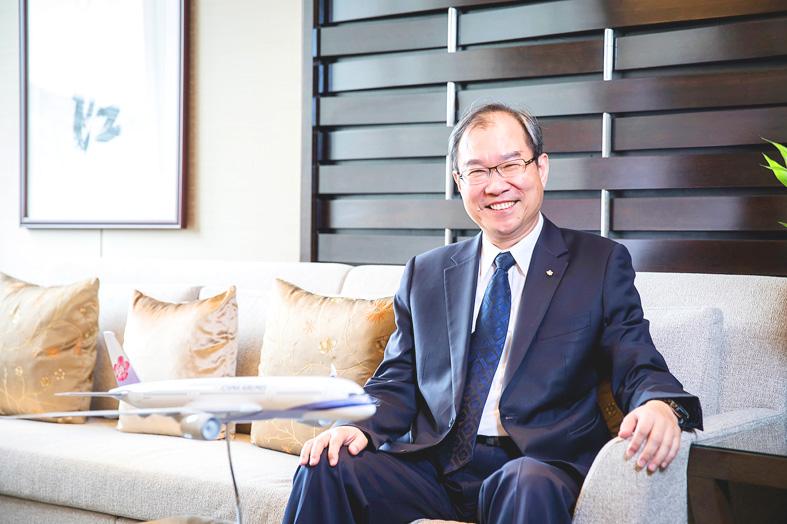China Airlines Ltd (CAL, 中華航空) yesterday reported a net profit of NT$140 million (US$4.95 million), a turnaround from a net loss of NT$1.19 billion in 2019, thanks to the contribution of its air cargo business, which helped to offset a dwindling passenger business amid the COVID-19 pandemic and losses at its other air travel units.
Earnings per share were NT$0.03, compared with losses per share of NT$0.22 in 2019.
The company’s board of directors decided not to distribute a cash dividend this year, a Taiwan Stock Exchange filing said.

Photo courtesy of China Airlines
The airline said that its subsidiaries, such as Taoyuan International Airport Service Co Ltd (桃園航勤), Tigerair Taiwan Co Ltd (台灣虎航) and Kaohsiung Airport Catering Services Ltd (高雄空廚) — in which it owns stakes of 49 to 75 percent — remained in the red last year due to the pandemic.
Thanks to 18 cargo jets and higher freight rates, the airline’s cargo revenue last year increased 88.2 percent to NT$81.69 million, which offset a 78.7 percent decline in passenger revenue, company data showed.
The airline said in a separate regulatory filing that its board of directors had appointed senior vice president Kao Shing-hwang (高星潢), who had worked for the company for 35 years, as president, while chairman Hsieh Shih-chien (謝世謙) would step down from the role.
Hsieh said in a statement that he expects the air cargo business to remain rosy in the second half of this year, while CAL is to continue improving service between Taiwan and the US, as well as expanding its presence in the European and Indian markets.
When the air travel business resumes depends on the progress of vaccinations worldwide, he added.

Quanta Computer Inc (廣達) chairman Barry Lam (林百里) is expected to share his views about the artificial intelligence (AI) industry’s prospects during his speech at the company’s 37th anniversary ceremony, as AI servers have become a new growth engine for the equipment manufacturing service provider. Lam’s speech is much anticipated, as Quanta has risen as one of the world’s major AI server suppliers. The company reported a 30 percent year-on-year growth in consolidated revenue to NT$1.41 trillion (US$43.35 billion) last year, thanks to fast-growing demand for servers, especially those with AI capabilities. The company told investors in November last year that

Intel Corp has named Tasha Chuang (莊蓓瑜) to lead Intel Taiwan in a bid to reinforce relations between the company and its Taiwanese partners. The appointment of Chuang as general manager for Intel Taiwan takes effect on Thursday, the firm said in a statement yesterday. Chuang is to lead her team in Taiwan to pursue product development and sales growth in an effort to reinforce the company’s ties with its partners and clients, Intel said. Chuang was previously in charge of managing Intel’s ties with leading Taiwanese PC brand Asustek Computer Inc (華碩), which included helping Asustek strengthen its global businesses, the company

Taiwanese suppliers to Taiwan Semiconductor Manufacturing Co. (TSMC, 台積電) are expected to follow the contract chipmaker’s step to invest in the US, but their relocation may be seven to eight years away, Minister of Economic Affairs J.W. Kuo (郭智輝) said yesterday. When asked by opposition Chinese Nationalist Party (KMT) Legislator Niu Hsu-ting (牛煦庭) in the legislature about growing concerns that TSMC’s huge investments in the US will prompt its suppliers to follow suit, Kuo said based on the chipmaker’s current limited production volume, it is unlikely to lead its supply chain to go there for now. “Unless TSMC completes its planned six

TikTok abounds with viral videos accusing prestigious brands of secretly manufacturing luxury goods in China so they can be sold at cut prices. However, while these “revelations” are spurious, behind them lurks a well-oiled machine for selling counterfeit goods that is making the most of the confusion surrounding trade tariffs. Chinese content creators who portray themselves as workers or subcontractors in the luxury goods business claim that Beijing has lifted confidentiality clauses on local subcontractors as a way to respond to the huge hike in customs duties imposed on China by US President Donald Trump. They say this Chinese decision, of which Agence